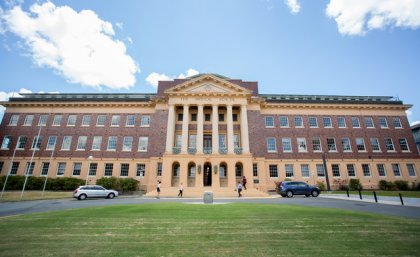
University of Queensland research into dementia, cancer, superbugs, painkillers, and children’s health are among 51 projects that will benefit from National Health and Medical Research Council (NHMRC) 2018 Project Grant funding announced today.
The medical grants body’s $42.88 million allocation for UQ research projects is almost $10 million more than the $32.98 million it granted the University in 2017.
Vice-Chancellor and President Professor Peter Høj said UQ’s health research focused on practical solutions for medical conditions affecting millions of people around the world.
“The funding will support research into dementia diagnosis, intervention and care, work to develop non-opioid painkillers, and projects focussing on cancer, superbugs and the management of asthma in pregnancy,” Professor Høj said.
 He said the significant rise in UQ’s NHMRC Project Grant funding was an affirming reflection of UQ’s researchers and their work.
He said the significant rise in UQ’s NHMRC Project Grant funding was an affirming reflection of UQ’s researchers and their work.
“The NHMRC saw the potential for many of the UQ proposals to transform the way we treat disease,” he said.
He noted two of the grants were worth more than $2 million and 10 were for more than $1 million.
Close to half of UQ’s 2018 funding will go to the Faculty of Medicine, accounting for $20 million across 18 projects.
Another 10 projects at UQ’s Institute for Molecular Bioscience will share $7.8 million.
Queensland Brain Institute researchers have been awarded more than $6.4 million across 11 NHMRC project grants.
Professor Jürgen Götz received two grants totalling $1.2 million over four years to further explore ultrasound as a method to treat and prevent neurodegenerative disease, and to investigate the role of the molecule TYROBP in Alzheimer’s disease.
Associate Professor Tim Bredy received $531,978 to research DNA modifications underlying sex differences in fear-related learning and memory.
The full list of QBI project grants are here.
Faculty of Medicine intensive care specialist Professor Andreas Schibler received two grants totalling $4.5 million, including $2.63 million for research into acute respiratory failure – the most common reason children are admitted to hospital.
Professor Schibler hopes early intervention with new “nasal hi-flow” therapy to support breathing could reduce the number of children admitted to intensive care.
Professor Schibler also received $1.9 million for research into congenital heart disease – a leading cause of infant mortality in industrialised countries.
Dr Leanne Sakzewski in the Faculty of Medicine was awarded grants totalling $2.1 million for two projects that aim to improve movement and quality of life for children with cerebral palsy.
Funding to Institute for Molecular Bioscience research included $1.09 million for Professor Alpha Yap’s work examining a newly discovered mechanism the body uses to protect itself from cancer.
Executive Dean of Science Professor Melissa Brown congratulated successful researchers, including six School of Chemistry and Molecular Biosciences-led projects.
“The NHMRC panels have appreciated the significance of the research projects being conducted on these globally important health and medical issues in the Science Faculty,” she said.
SCMB Head Professor Paul Young said School researchers would participate in 11 projects funded to $8.3 million, including six totalling $4.4 million led by School staff.
“This is an outstanding result – one more project grant to the School than last year - and includes two projects led by Dr Luke Guddat,” he said.
SCMB-led projects are:
- Professor Alex Khromykh will lead a four-year $910,780 project on viral and host factors determining outcomes of Zika virus infection;
- Professor Paul Young leads a three-year $862,061 project on virus vaccines that ensure preparedness against future public health emergencies, such as Ebola virus, Middle East Respiratory Coronavirus, Nipah virus and Lassa fever virus;
- Dr Philip Stevenson leads a three-year $668,144 project to understand how cytomegaloviruses establish systemic infection;
- Associate Professor Luke Guddat leads projects developing new drug candidates for human tuberculosis ($680,585 over three years); and versatile drugs to treat infectious diseases ($755,585 over three years); and
- Professor Roy Hall leads a three-year, $549,936 project looking at a new generation of diagnostics and vaccines against mosquito-borne viral disease.
SCMB researchers will also participate in five projects on topics including designing novel and safe drugs to selectively target resistant tumours; studying how our innate immune system uses zinc to combat bacterial infections; killing infected cells to eradicate tuberculosis; identifying resistance mutations in a new class of drugs to treat TB; and developing novel TB drug candidates.
A full list of NHMRC Project Grant funding is here.
Images: (top) the UQ Faculty of Medicine building at Herston in Brisbane; above Vice-Chancellor Professor Peter Høj.
Contact: Fiona Cameron, UQ Communications, communications@uq.edu.au, +61 7 3346 7086.
.jpg)










